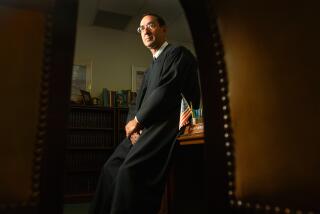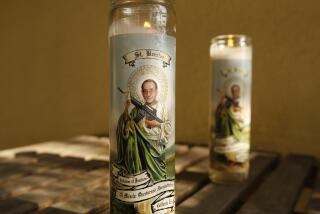2-Year Term for Judge Claiborne Allowed to Stand
- Share via
WASHINGTON — The Supreme Court cleared the way Monday for imposition of a two-year prison term and a $10,000 fine for U.S. District Judge Harry E. Claiborne of Las Vegas, the first federal judge in this century convicted of committing a felony while in judicial office.
Claiborne, 68, has remained free pending appeal of his conviction in 1984 on tax evasion charges. He has refused to resign and remains on the bench--drawing a salary of $78,200--but has voluntarily declined to hear cases.
Last year, a federal appeals court in San Francisco upheld Claiborne’s conviction and on Monday the high court issued a brief order declining to hear his subsequent appeal.
Impeachment Cited
Claiborne’s lawyers had contended that under the Constitution, federal judges must be impeached before they may be subjected to criminal prosecution. They also claimed that prosecutors wanted to drive Claiborne from office because of his success as a criminal defense lawyer before he took the bench.
He had been convicted of failing to report $108,000 in income on his 1979 and 1980 tax returns, money earned during his years as a defense attorney but not paid to Claiborne until he became a judge in 1978.
Claiborne is the third federal district judge prosecuted in the last three years and the first to be convicted for a crime committed while in office. Judge Walter Nixon of Mississippi was found guilty of perjury and sentenced last month to five years in prison. Judge Alcee Hastings of Miami was acquitted of bribery charges in 1983.
‘Battle Is Not Over’
Claiborne’s attorney, Oscar Goodman of Las Vegas, said his client would not discuss the action except to say that “the battle is not over.” Goodman said he would meet with Claiborne today.
In another ruling, the court, by a 6-2 vote, ruled that Los Angeles city officials may not be required to defend against a civil rights suit brought by an Idaho man claiming that he was the victim of excessive force when he was stopped by city police on suspicion of driving while intoxicated.
The justices summarily overturned a decision by a federal appeals court in San Francisco that held that the city still could be sued, even though a trial jury earlier found in favor of a police officer named as a defendant along with the city.
The suit was brought by Ronald Heller of Ketchum, Ida. Heller, who fell through a plate-glass window as police attempted to arrest and handcuff him, contended that his constitutional rights were violated by the officer’s excessive force and by a city policy that encouraged such force.
Claims Separated
In a relatively unusual move, the trial court separated the claims against the officer, Craig Bushey, from the other defendants in the case, and the jury found for Bushey. The appeals court held that, although the jury was not so instructed, it could have ruled for the officer in the belief that he was merely carrying out city policy. Thus, it said, the city could still be required to defend its policy.
But the Supreme Court said in the case (City of Los Angeles vs. Heller, 85-531) that a municipal corporation could not be held liable for an action by an officer that a jury concluded caused no constitutional violation.
In another case, the justices let stand a California Supreme Court ruling barring the City of Corona from hiring a private attorney to seek to close down an adult bookstore allegedly violating the city’s public nuisance ordinance.
The attorney was to be paid $60 an hour if he won--but only $30 an hour if he lost, and the state court held unanimously that the agreement, giving the lawyer a personal financial interest in the outcome, violated the standard of neutrality required of an attorney representing the government (City of Corona vs. Superior Court, Riverside, 85-1402).
More to Read
Sign up for Essential California
The most important California stories and recommendations in your inbox every morning.
You may occasionally receive promotional content from the Los Angeles Times.









